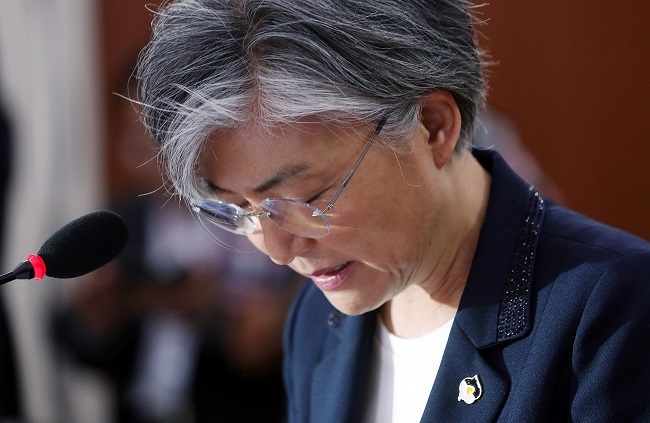As opposition lawmakers waged attacks over suspected irregularities, Foreign Minister nominee Kang Kyung-wha apologized while defending against some of their allegations and stressing her credentials as a seasoned diplomat, during her confirmation hearing Wednesday.
The National Assembly grilled the former UN official together with Deputy Prime Minister and Finance Minister nominee Kim Dong-yeon and Constitutional Court President nominee Kim Yi-su in separate sessions.
Opposition legislators relayed doubts over Kang’s qualifications, taking issue with a multitude of allegations -- her past false address registration, belated gift tax payment, real estate speculation and doctorate thesis plagiarism, among others.
 |
Kang Kyung-wha, nominated as the first female foreign minister, apologizes at her confirmation hearing in Seoul on Wednesday. (Yonhap) |
In contrast, members of the ruling Democratic Party of Korea focused on examining her views on key policy issues, while expressing hopes for her appointment as the nation’s top female minister.
Kang acknowledged her responsibility for irregularities such as her use of the address of an acquaintance to have her daughter admitted to her alma mater in 2000, as well as her family’s understatement of home purchase prices in 2004, which critics called an attempt to evade tax.
But she adamantly rejected as “groundless” the suspicions of a speculative buy of her family’s second home on Geoje Island, South Gyeongsang Province. She also said she could not “accept” the plagiarism claim from Liberty Korea Party Rep. Lee Ju-young, presenting a test result by the same checker which showed that less than 1 percent of her multi-hundred page dissertation proved identical to the paper he suggested.
“I realized to my bone how strict the people’s standards for public servants are. I am so sorry and deeply apologize for having caused trouble due to the unthoughtful behavior of mine and my family’s,” Kang said.
“If I was given the chance to work as the foreign minister, I will exercise new leadership and open a new diplomatic horizon under the grave diplomatic and security circumstances at home and abroad built on my capabilities and experiences from the UN.”
On the policy front, Kang voiced strong criticism over a December 2015 settlement on the sex slavery rows with Japan, singling out the opaque nature of the 1 billion yen ($9 million) provided by Tokyo and the clause that the deal is “final and irreversible.”
The nominee elicited attention as she turned up at the hearing with a badge which symbolizes the “comfort women” attached to her jacket. She said she received it during her June 2 visit to the House of Sharing, a shelter of sex slavery victims in Gwangju, Gyeonggi Province.
“As a person who handled human rights at the UN for six years, I found many parts of the agreement to be odd -- I questioned if this was an agreement that employed a victim-oriented approach, and if it properly embraced what is to remain lessons of past history,” she said.
“The nature of 1 billion yen is unclear, and it says it was a final and irreversible settlement. I think these are something that would come out of a military accord.”
Any resolution on human rights violations should address legal responsibility and compensation issues centering on the victims’ view, and its lack contributed to the sour public sentiment that “cannot emotionally accept” the deal, Kang said.
But she did not directly mention the possibility of a renegotiation, acknowledging it was a formal -- albeit not legally binding -- agreement between two governments.
“We could explore all options in order to move forward,” she said. “Ultimately Japan should take sincere steps, steps that touch the hearts of the victims, and I will make active efforts in that direction.”
Amid unabated controversy over the US’ Terminal High Altitude Area Defense system here, Kang endorsed its deployment as a joint alliance decision with Washington but highlighted the absence of domestic discussions in the lead-up to the announcement.
“The point is that sufficient efforts have not been made to gather public opinion so the plan did not get national consensus. And that’s why it needs to be discussed at the Assembly,” she said.
On North Korea, Kang pledged to sternly deal with its provocations while ensuring international consultations if the Moon Jae-in government moves to restart the Kaesong Industrial Park or tours to Mount Kumkang in line with denuclearization progress.
“I concur that the Kaesong complex may be a first step to defuse tension, build trust and foster economic cooperation with the North, but the environment we’re in now is a lot different from when the project kicked off,” the nominee said.
“We will closely discuss the UN Security Council states in the future when and if the right conditions are formed, such as progress on denuclearization and a change in the international community’s approach to the North, and the restart issues are considered in earnest.”
With lawmakers relaying high expectations for her soft power leadership, Kang displayed her resolve to become the first female top diplomat.
“Regarding my glass-ceiling breaking role, when I returned home after studying in the US and tried to become a professor, I could not, despite going through some part-time positions. And I’ve recently heard that many female students I taught had given up on continuing studies, watching my failure,” she said.
“Now I want to tell you that my determination for this job is all the stronger. I’m resolute to devote myself to the remaining life as a public servant.”
By Shin Hyon-hee (
heeshin@heraldcorp.com)







![[Today’s K-pop] Blackpink’s Jennie, Lisa invited to Coachella as solo acts](http://res.heraldm.com/phpwas/restmb_idxmake.php?idx=644&simg=/content/image/2024/11/21/20241121050099_0.jpg)
